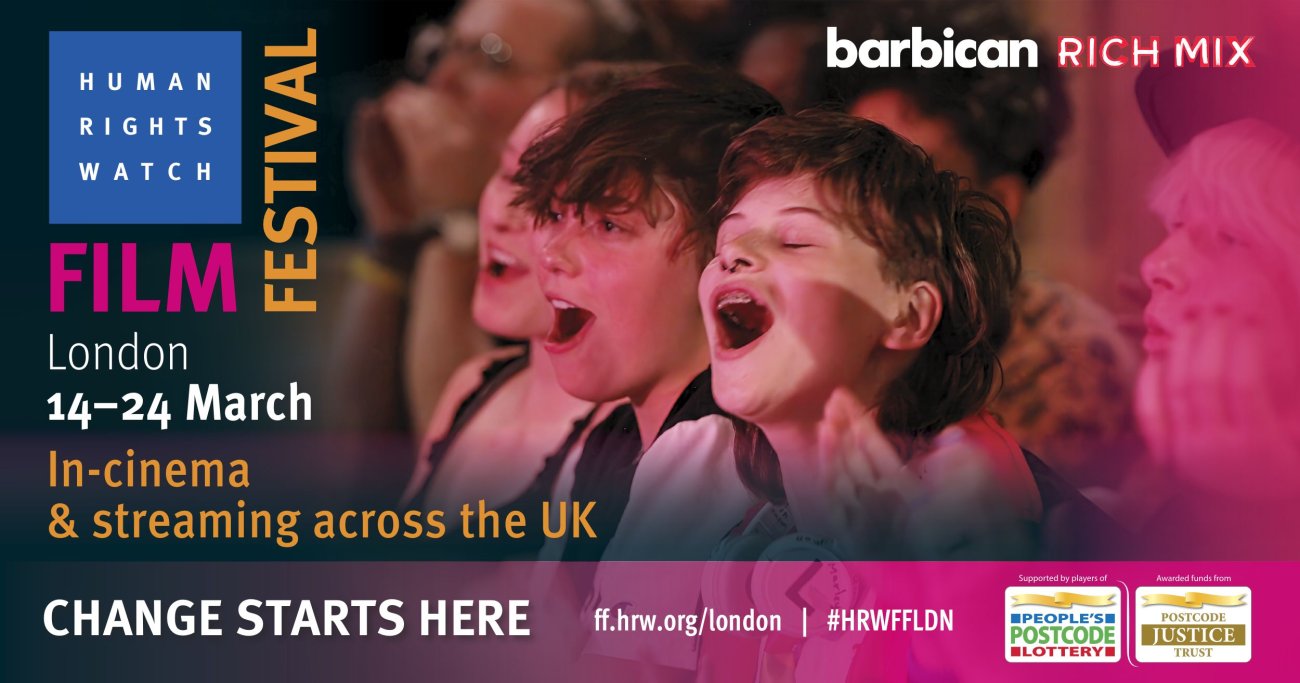We are proud to present the 28th edition of the London Human Rights Watch Film Festival, running from March 14-24, 2024, in partnership with Barbican Cinema and Rich Mix. This year’s edition features the role of youth in the fight for human rights, the convergence of art and human rights, and the rising up to confront systems of power; what shines through is the determination and courage of individuals standing up for their freedom and rights.
This year’s festival will present 10 films screening in-person at the Barbican and Rich Mix from March 14-22 with in-depth post film discussions with filmmakers, film participants, activists, and Human Rights Watch researchers; and digitally across the UK and Ireland from March 18-24.
Young people and human rights take centre stage in four films this year, beginning with our opening night film Mediha, a heartfelt and intimate account of a teenage Yazidi girl recently returned from Islamic State (ISIS) captivity, who turns the camera on herself as she initiates investigations into the crimes committed against her, and in the process stands up for her family and the Yazidi people. Coconut Head Generation provides front-row seats for lively, political, and impassioned debates in a student’s film club in Nigeria as they unpack critical issues facing young people today – from colonialism to government corruption, gender and equality. In Power Alley, one of our three dramas this year, we meet a young and vibrant LGBT-inclusive volleyball team in Brazil who support and fight for each other’s dignity and rights, especially vital when one of their team members must seek an abortion in a country where it is illegal. The festival continues its celebration of young people in our closing night film Summer Qamp, an uplifting, funny and moving look at Camp fYrefly in the forests of Alberta, Canada where LGBTQ+ teens explore their authentic selves, make friends and build community – far away from the fierce political battle being waged against them.
Opposing systems of power is the focus of four films in this year’s program. Two stand-out dramas include After the Fire - a powerful look at a family’s fight for truth and justice after their son’s death during a police investigation, pulling back the curtain on France’s long history of racial profiling and police violence. The sharp-witted and beautifully acted Inshallah a Boy introduces us to Nawal, a quietly powerful Jordanian mother whose husband unexpectedly passes away, leaving her to battle against the patriarchal legal system and her brother-in-law who attempts to claim all her assets including guardianship of her daughter. Two more documentaries speak truth to power loud and clear - Land of My Dreams filmmaker Nausheen Khan draws on her identity as an Indian Muslim woman, intimately capturing the intergenerational, multi-faith women at the forefront of a nationwide non-violent resistance movement to protest the Indian Government’s Citizenship Amendment Act that disproportionately impacts Muslims, denying citizenship to many. And We Are Guardians centers the powerful and dangerous work of indigenous forest guardians battling governmental indifference, politically connected agribusinesses, cattle ranchers and illegal loggers as they fight to protect their traditional land in the increasingly vulnerable Amazon rain forest.
The festival takes a close at art and human rights in two films in our program. A Revolution on Canvas is a remarkable profile of one of Iran’s most revolutionary artists, Nickzad ‘Nicky’ Nodjoumi. Filmmakers Sara Nodjoumi and Till Schauder create a rich tapestry of family history, artistic freedom, politics and persecution that boldly reveals the power of art in the fight for human rights. Utilizing stunning animation that brings to life the work of Russian visual artist and activist Victoria Lomasko, Tree of Violence follows Victoria as she investigates the connection between domestic and state-sponsored violence and patriarchy through her art, while the invasion of Ukraine unfolds, and her personal safety in her homeland becomes less assured.
This year’s program reflects the festival’s ethos of celebrating representation, and diversity of content and perspective. We strive to prioritise space for identities, viewpoints, forms of expertise and experiences either silenced or marginalised in the film industry, news, and media.
We welcome you to join us in celebrating the power of individuals to make a difference at this year’s Human Rights Watch Film Festival.
